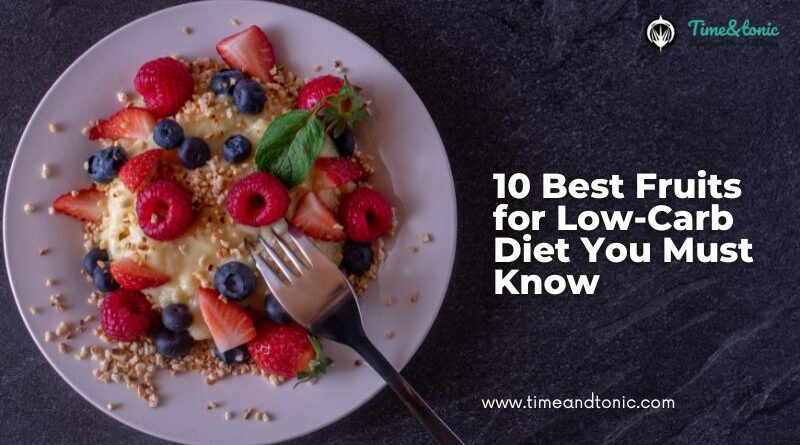10 Best Fruits for Low-Carb Diet You Must Know
Best Fruits for Low-Carb Diet – Are you on a mission to shed those extra pounds, manage your blood sugar levels, or simply adopt a healthier lifestyle? If so, you’ve likely come across the concept of a low-carb diet. Low-carb diets have gained immense popularity for their potential to help individuals achieve their health and fitness goals. And while they often emphasize reducing carbohydrate intake, it doesn’t mean you have to bid farewell to all fruits.
In fact, incorporating the best fruits for a low-carb diet can be a delightful and nutritious way to stay on track with your low-carb lifestyle. Fruits, known for their natural sweetness and an array of essential nutrients, can still find their place in your daily menu. But not all fruits are created equal in the low-carb world. This comprehensive guide will walk you through the top fruit choices that align with your low-carb goals, their nutritional profiles, and how to savor them in your meals. Get ready to explore a world of fruity goodness without compromising your low-carb journey!
How Fruits Can Fit into a Low-Carb Diet
When you think of low-carb diets, you might picture a plate filled with meat, vegetables, and no room for fruits. However, with careful selection and portion control, fruits can absolutely fit into a low-carb diet. Here’s how:
- Choose Low-Carb Fruits: Not all fruits are high in carbohydrates. Some are naturally lower in carbs and sugar, making them perfect for a low-carb diet. Focus on fruits like berries (e.g., strawberries, blueberries, raspberries), avocados, and melons, as they are lower in carbs compared to tropical fruits like bananas or pineapples.
- Watch Portion Sizes: The key to incorporating fruits into a low-carb diet is moderation. While fruits are nutritious, they still contain carbs, so be mindful of your portion sizes. Stick to smaller servings to manage your carb intake.
- Opt for Whole Fruits: Whole fruits are a better choice than fruit juices or dried fruits. Whole fruits provide fiber, which can help stabilize blood sugar levels and make you feel full longer. Juices and dried fruits, on the other hand, are concentrated sources of sugar and can lead to rapid blood sugar spikes.
- Balance with Other Low-Carb Foods: To maintain a low-carb balance, pair your fruit servings with other low-carb foods like lean proteins, non-starchy vegetables, and healthy fats. This combination ensures you get a well-rounded, satisfying meal while managing your carb intake.
- Consider Net Carbs: Net carbs are calculated by subtracting fiber from total carbohydrates. Since fiber doesn’t significantly impact blood sugar levels, you can subtract it from the total carb count in fruits to get a more accurate picture of their impact on your diet. Fruits with higher fiber content are often better choices for a low-carb diet.
- Timing Matters: Timing your fruit consumption can also help manage your carb intake. Some people find it beneficial to eat fruits earlier in the day when their bodies are more active and can better metabolize the carbs.
Also, Read – Low-Calorie Vegetables for Carb-Conscious Diet
Benefits of Incorporating These Fruits into Your Low-Carb Diet
While following a low-carb diet, integrating specific fruits into your daily meals can offer a range of health benefits. These fruits are not only low in carbs but also packed with essential nutrients, antioxidants, and other advantages. Here are the benefits of incorporating these fruits:
- Nutrient-Rich Profile: Low-carb fruits, such as berries and melons, are rich in vitamins, minerals, and antioxidants. They provide essential nutrients like vitamin C, vitamin K, potassium, and folate, which are vital for overall health and wellbeing.
- Fiber Content: Many low-carb fruits are high in dietary fiber. Fiber is essential for digestive health and can help prevent constipation. It also contributes to a feeling of fullness, which can aid in weight management and portion control.
- Antioxidants: Berries, in particular, are known for their high antioxidant content. Antioxidants combat oxidative stress in the body, reducing the risk of chronic diseases and supporting overall health.
- Blood Sugar Control: Low-carb fruits tend to have a lower glycemic index, which means they have a less significant impact on blood sugar levels. This can be beneficial for individuals with diabetes or those looking to stabilize their energy levels throughout the day.
- Weight Management: Fruits like avocados are high in healthy fats and fiber, both of which contribute to a feeling of satiety. Including these fruits in your diet can help you feel full and satisfied, reducing the temptation to overeat.
- Heart Health: Potassium, found in fruits like melons, is essential for heart health. It helps regulate blood pressure and reduces the risk of stroke. Additionally, the antioxidants in berries have been associated with improved cardiovascular health.
- Skin Health: The vitamins and antioxidants in these fruits can promote healthy, glowing skin. Vitamin C, for instance, supports collagen production, which is essential for skin elasticity.
- Reduced Risk of Chronic Diseases: Regular consumption of low-carb fruits has been linked to a reduced risk of chronic diseases, including certain types of cancer, due to their antioxidant and anti-inflammatory properties.
Best Fruits for Low-Carb Diet
A low-carb diet typically limits your carbohydrate intake while allowing you to consume moderate amounts of protein and fats. Here are some fruits that are relatively low in carbohydrates and can be included in a low-carb diet in moderation:

Berries
Berries are an excellent choice for a low-carb diet. They’re not only delicious but also low in carbohydrates. Strawberries, raspberries, and blackberries are some of the lowest-carb options. A half-cup serving of strawberries contains about 6 grams of carbs, while raspberries and blackberries have even fewer carbs, around 3-4 grams per half-cup.
Berries are also rich in fiber, which helps with digestion and can aid in managing blood sugar levels. They’re packed with antioxidants, vitamins, and minerals, making them a healthy choice for snacking or adding to your meals.
You can enjoy berries on their own, add them to yogurt or cottage cheese, blend them into smoothies, or use them as a topping for salads. Their natural sweetness can satisfy your cravings for something sweet while keeping your carb intake in check.
Also, Read – Low Carb Grocery List
Avocado
Avocado is a standout fruit for a low-carb diet. While technically a fruit, it’s extremely low in carbohydrates and high in healthy fats. A typical medium-sized avocado contains only about 9 grams of carbs, with a significant portion being fiber, which aids in digestion and helps stabilize blood sugar levels.
The healthy monounsaturated fats in avocados not only make them a satisfying addition to meals but also provide essential nutrients. They are a great source of vitamins like B6, C, E, and folate, along with minerals such as potassium, which is crucial for heart health.
You can enjoy avocado slices in salads, mash them for guacamole, or use them as a creamy, low-carb spread in place of mayo or butter. Avocado’s versatility, rich flavor, and low carbohydrate content make it an excellent choice for those following a low-carb eating plan.
Tomatoes
Tomatoes are a relatively low-carb fruit and can be a flavorful addition to a low-carb diet. A typical medium-sized tomato contains around 5-6 grams of carbohydrates, with a substantial portion consisting of fiber. This fiber aids in digestion and can help stabilize blood sugar levels.
Tomatoes are also packed with essential nutrients like vitamin C, potassium, and antioxidants, which promote overall health. They provide a burst of freshness and taste to salads, omelets, and various low-carb dishes.
However, it’s essential to moderate your tomato consumption, especially if you’re on a very strict low-carb diet, as carbs can add up when consuming larger quantities. Keep in mind that tomato-based products like sauces and ketchup may have added sugars, so it’s wise to opt for sugar-free versions or make your own at home to control carb intake.

Lemons and Limes
Lemons and limes are ideal for a low-carb diet. These citrus fruits are exceptionally low in carbohydrates. A typical lemon contains around 3-4 grams of carbs, while a lime has approximately 5 grams of carbs. However, most of these carbs come from fiber, which can be subtracted from the total carb count, making them virtually carb-free.
Additionally, lemons and limes are rich in vitamin C, antioxidants, and can add a zesty, refreshing flavor to your meals and beverages. You can use their juice to enhance the taste of water, salads, marinades, or as a low-carb alternative to high-sugar dressings and flavorings. Due to their minimal carb content, lemons and limes are excellent choices for those seeking to minimize carb intake while adding a burst of citrusy flavor to their dishes and drinks.
Coconut
Coconut is a versatile and low-carb option for a variety of diets, including low-carb diets. Both fresh coconut meat and unsweetened coconut products like coconut milk or shredded coconut are relatively low in carbohydrates.
Fresh coconut meat contains approximately 4-6 grams of net carbs per 100 grams, making it a suitable choice for snacking or adding to dishes for a unique flavor and texture. Coconut milk, especially the unsweetened varieties, typically contains around 1-2 grams of net carbs per cup and can be used in cooking, baking, or making creamy sauces.
Coconut is rich in healthy fats, particularly medium-chain triglycerides (MCTs), which can provide quick energy and promote fat burning. Additionally, it provides fiber, vitamins, and minerals—essential nutrients.
Just be cautious with sweetened coconut products, as they can be high in added sugars, which can significantly increase the carb content. In summary, unsweetened coconut products can be a valuable addition to a low-carb diet, adding flavor and healthy fats without excessive carbohydrates.
Cantaloupe
Cantaloupe is a moderately low-carb fruit that can be enjoyed in moderation on a low-carb diet. A typical one-cup serving of diced cantaloupe contains approximately 11-13 grams of carbohydrates. While it has more carbs than some other low-carb fruits like berries, it is still lower in carbohydrates compared to many other fruits.
Potassium and the vitamins A and C are both abundant in cantaloupe. Its natural sweetness can satisfy cravings for something sweet without significantly spiking blood sugar levels due to its fiber content. However, it’s important to consume cantaloupe in limited portions to keep your carb intake in check.
Enjoy cantaloupe as a refreshing snack or add it to salads for a burst of flavor and color. Remember that portion control is essential when including moderate-carb fruits like cantaloupe in your low-carb diet plan.

Watermelon
Watermelon is a relatively low-carb fruit that can be enjoyed in moderation on a low-carb diet. A one-cup serving of diced watermelon contains approximately 11-12 grams of carbohydrates. While it has more carbs than some other low-carb fruits, it’s still lower in carbohydrates compared to many other fruits.
The high water content of watermelon is well known for keeping you hydrated. It’s also a good source of vitamins A and C and provides some antioxidants. However, because of its carbohydrate content, it’s important to consume watermelon in moderation to stay within your daily carb limit.
Enjoy watermelon as a refreshing summer treat, but be mindful of portion sizes to avoid excessive carb intake. It’s a great addition to picnics and gatherings, providing natural sweetness without added sugars.
Kiwi
Kiwi is a relatively low-carb fruit that can be included in a moderate amount in a low-carb diet. One medium-sized kiwi contains approximately 11-12 grams of carbohydrates. While it’s not as low in carbs as some other fruits like berries, it can still be enjoyed in moderation.
Kiwi is a nutritional powerhouse, packed with vitamin C, vitamin K, vitamin E, fiber, and antioxidants. It’s known for its unique sweet-tart flavor and vibrant green flesh speckled with tiny black seeds. The fiber in kiwi can aid digestion and help regulate blood sugar levels.
To incorporate kiwi into your low-carb diet, slice it and add it to salads, yogurt, or enjoy it as a standalone snack. Just be mindful of portion sizes to ensure that you stay within your daily carb limit, as the carb content can add up if you consume large quantities.
Peaches and Plums
Peaches and plums are moderately low-carb fruits suitable for a low-carb diet when consumed in moderation. A medium-sized peach contains approximately 13-15 grams of carbohydrates, while a medium plum has around 7-8 grams of carbohydrates. While they have more carbs than some other low-carb fruits, they can still be enjoyed in sensible portions.
Peaches and plums provide essential vitamins, including vitamin C and vitamin A, as well as dietary fiber. The fiber content can aid digestion and help manage blood sugar levels. When incorporating these fruits into your low-carb diet, be mindful of portion control to avoid excessive carb intake.
You can enjoy peaches and plums as snacks, add them to salads, or use them in low-carb dessert recipes. While they’re not as low in carbs as some other options, they can still be part of a balanced low-carb eating plan when eaten in moderation.

Apricots
Apricots are a relatively low-carb fruit that can be enjoyed in moderation as part of a low-carb diet. One medium apricot typically contains around 3-4 grams of carbohydrates, making it a suitable choice for those watching their carb intake.
These vibrant orange fruits are rich in essential nutrients, including vitamins A and C, which are important for skin health and immune support. They also provide dietary fiber, which aids in digestion and can help regulate blood sugar levels.
To incorporate apricots into your low-carb diet, you can enjoy them as a convenient snack or add them to salads for a burst of sweetness and color. Just be mindful of portion sizes to ensure that you stay within your daily carb limit, as consuming large quantities could increase your carb intake.
Conclusion
Incorporating the best fruits for a low-carb diet is not just about delicious flavors; it’s a smart and healthy choice. From the antioxidant-rich berries to the creamy goodness of avocados, these fruits offer a wealth of nutrients while keeping your carb intake in check. By making mindful choices, moderating portions, and balancing your fruit consumption with other low-carb foods, you can enjoy the benefits of both a low-carb lifestyle and the natural goodness of these fruits. Embrace the sweetness of nature while staying true to your health and fitness goals.
FAQs
A low-carb diet can lead to weight loss, improved blood sugar control, reduced risk of type 2 diabetes, better cardiovascular health, and increased energy levels. It may also help manage conditions like epilepsy and polycystic ovary syndrome (PCOS).
Yes, some fruits can be consumed on a ketogenic diet, but they need to be carefully selected due to their carb content. Berries like strawberries and raspberries are lower in carbs and can be incorporated in moderation. However, high-sugar fruits like bananas and grapes are generally limited on a ketogenic diet.
To calculate net carbs in fruits, subtract the fiber content from the total carbohydrate content listed on the nutrition label or in a nutritional database. Net carbs provide a more accurate representation of the carbs that affect blood sugar levels.




